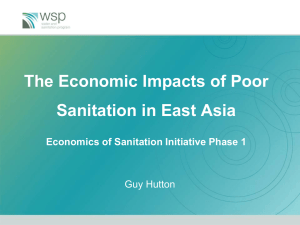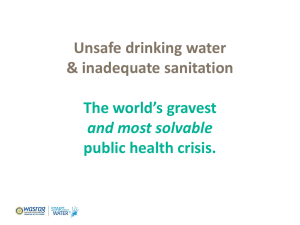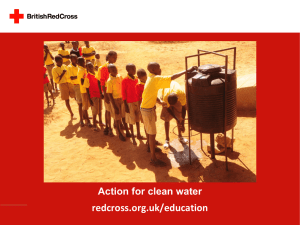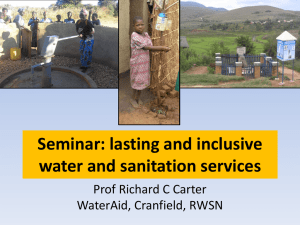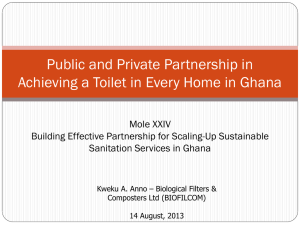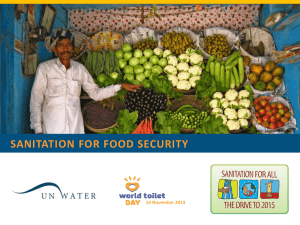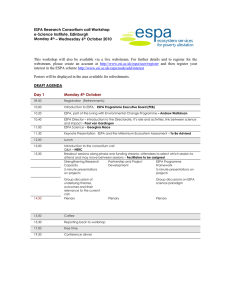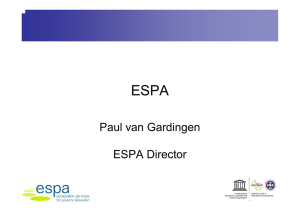ESPA
advertisement
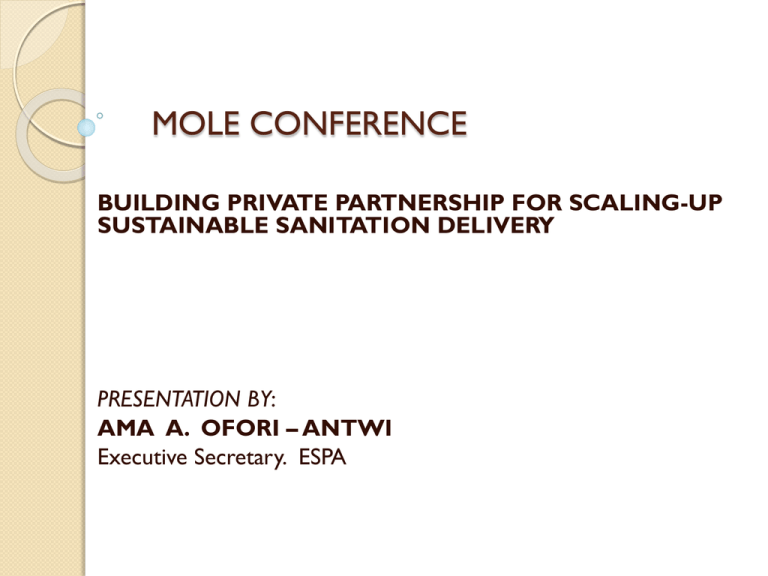
MOLE CONFERENCE BUILDING PRIVATE PARTNERSHIP FOR SCALING-UP SUSTAINABLE SANITATION DELIVERY PRESENTATION BY: AMA A. OFORI – ANTWI Executive Secretary. ESPA FORMAT What is ESPA Brief Background of Public Private Partnership in waste management Challenges that Private Partners Providing The Services Face Building Private Partnership For Scaling UP Sustainable Sanitation Delivery WHAT IS ESPA ? ENVIRONMENTAL SERVICES PROVIDERS ASSOCIATION. •Waste management companies that have come together •The Mission of ESPA is to “complement and support Government’s effort to resolve environmental sanitation in our communities”. ESPA objectives include to Co-ordinate the activities of member companies; Support and carry out environmentally sound services; Mobilise capital and provide machinery for effectual utilization of support packages for the sector made available through national and multinational organizations; Initiate and support research programmes for appropriate technology and management techniques; Advocate total participation of private sector in all aspects of waste management and environmental sanitation and Provide a system of waste management that is environmentally sound and publicly acceptable to all stakeholders ESPA Structure ESPA is a credible stake holder in the provision of sanitation and waste management services in Ghana. The association has new Executive headed by Dr Joseph Siaw Agyepong as the President. BACKGROUND OF PUBLIC PRIVATE PARTNERSHIP The provision of public infrastructure and services has typically been viewed as the responsibility of local government.(Assemblies, Municipal, Metro.) With Urbanization ; Background. Continued The traditional role of the Government as primary infrastructure and public provider is gradually being supplemented with private sector expertise and financing hence the adoption of the Public Private Partnership(PPP) BackgroundContinued In 1986, the Government of Ghana decided to accept private sector participation in wastes management and environmental sanitation. This witnessed some private contractors coming on board to deliver waste management services. Background Continued Through their involvement, huge financial and operational burden were taken off the District Assemblies which traditionally were performing these municipal functions. THE PRIVATE PARTNERSHIP Challenges That Members’ Providing The Services Face The concept of the Ghanaian paying for sanitation and even subscribing to the service was difficult Private Partner introduced modernised equipments P.P. Introduction of equipment means large scale financial Capital Injection. Lack of Banks to invest in that sector as they considered it high risk factor Those that gave the loans, did so with high commercial interest charges. Lack of Local Government Support Procurement of equipment are capital intensive. Government do charge exorbitant taxes on newly imported machinery(Refuse Trucks). When contractors resort to importing second hand machines it also attract Penalty of over 50% cost in addition to the taxes. The contractors also found it impossible recover the cost for services rendered to communities, especially the poor and the vulnerable who are in the majority of resident One major problem for waste contractors is “supply of bins”. The government has not been able to meet the demand. Local Government in arrears of payment to contractors for services that has been provided. Lack of adequate incentives for member companies in operations of Landfills, Compost Plant and Recycling Plants Construction of landfill sites is also capital intensive. The Private Investor that invest in such projects are not able to recover cost simply because this is an entirely new area of waste management in Ghana. Compost produced in Ghana is also not being patronized to enable investor recoup it money . This is because of Government importation of chemical fertilizer into the country. Legislation and Enforcement by MMDA’s Metrolopolitan Municipal and District Assemblies also fail by being weak in the enforcement of bye laws on participation and compliance. Assemblies are weak in putting up relevant legislation on the delivery of services. Meanwhile the waste companies need bye laws to regulate the behaviour of residents There are instances where residents refuse to register for collection, others throw away waste into open spaces and drains etc Other residents who fail to pay for services rendered, thereby depriving waste companies needed revenue to operate. Political leadership Poor Institutional Memory Due to Rampant Reshuffle of Minister and Institutional Heads. Clear Policies Required Insufficient Public Education on Waste Management Poor public education by the various assemblies have contributed to lack of cooperation from the general public There is a direct correlation on impact of health, education and poverty reduction BUILDING PRIVATE PARTNERSHIP FOR SCALING-UP SUSTAINABLE SANITATION DELIVERY Advantages. The Private sector being the “engine of growth” in a developing economy the government therefore needs to come into partnership with the private sector in the delivery of such services. This partnership creates jobs, the employees will pay taxes also the profits of the private business increases and as such tax to be paid will also increase. Advantages(Continued) The private sector bring in large scale financial injection into the economy, technical management expertise in solid waste management and improve operating efficiencies in the system Scaling Up They can therefore scale up sustainable sanitation delivery in the country by coming together (ESPA in process) to have a strong voice to lobby Government for better conditions of service. The Government of Ghana for instance need to support and promote recycling of waste in the country. Scaling Up. (contd) It is a capital intensive project and investors are now operating at a loss. To alleviate this problem government is expected to come into partnership with the private investors so as to reduce the cost of operations. Recycling has a lot of advantages. Firstly, it reduces the negative impact on the environment. Secondly, the end products are put to a better economic use. Also the cost of operating landfills can be reduced. Concluding Remarks Inefficient management of waste leads to ill health which impacts on Government National Health Insurance Scheme(NHIS). For instance improper dumping of waste is an environmental hazard as it creates diseases such as cholera, diarrhoea, typhoid etc. Any person contracting any of these diseases will go to the hospital and claim on the NHIS. From the hospital he goes back to the same environment. This will turn out to be a viscous cycle? According to the World Health Organisation(WHO) “88% of diarrhoea cases are attributable to the poor environmental factors mainly from poor sanitation and excreta management. Available scientific evidence suggests that basic sanitation interventions can avert 36% of diarrhoea and improved sanitation and hygiene combined can avert 45% of cases. This can affect tourism and damaging economic implications for the country. (International conferences and programmes in Ghana can be cancelled). The individual being affected, whether a labourer or a manager leads to absenteeism and leading to labour cost Recommendations Government should therefore see the private waste companies as reliable partners and offer all the needed support to enable them thrive in these harsh economic environment. Since waste management is an infant industry in Ghana and important factor in health delivery system of the country, teething problems of the industry need to be tackled by Government Measures like task exemptions on vehicles and equipments will go a long way to support the industry. This will in no doubt encourage more companies to invest thereby scaling up the overall environmental sanitation of the country It is our believe that these simple measures by Government will help in achieving the Millennium Development Goal (MDG, 7) which seeks to ensure sustaining improvements in environmental sanitation. THANK YOU


